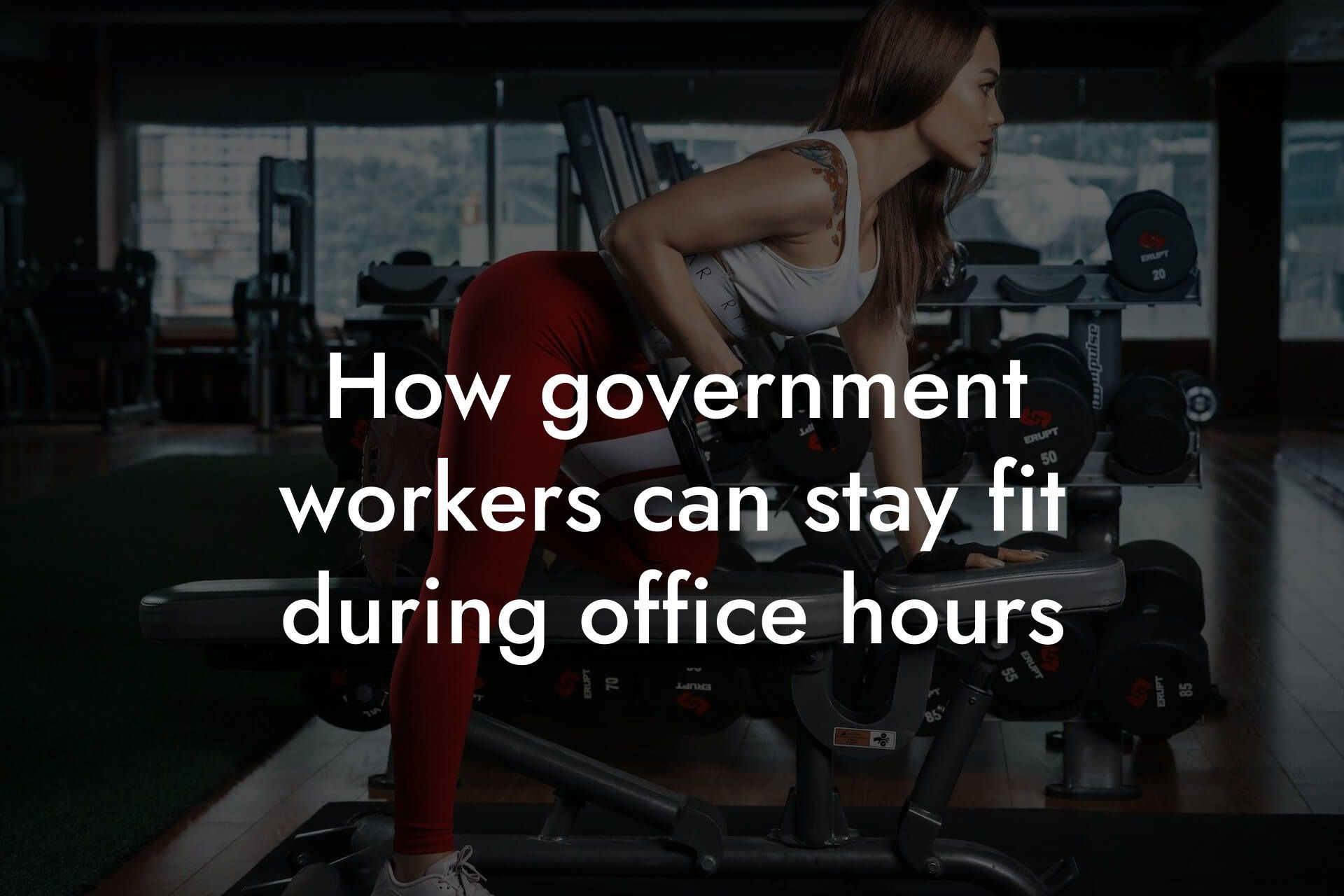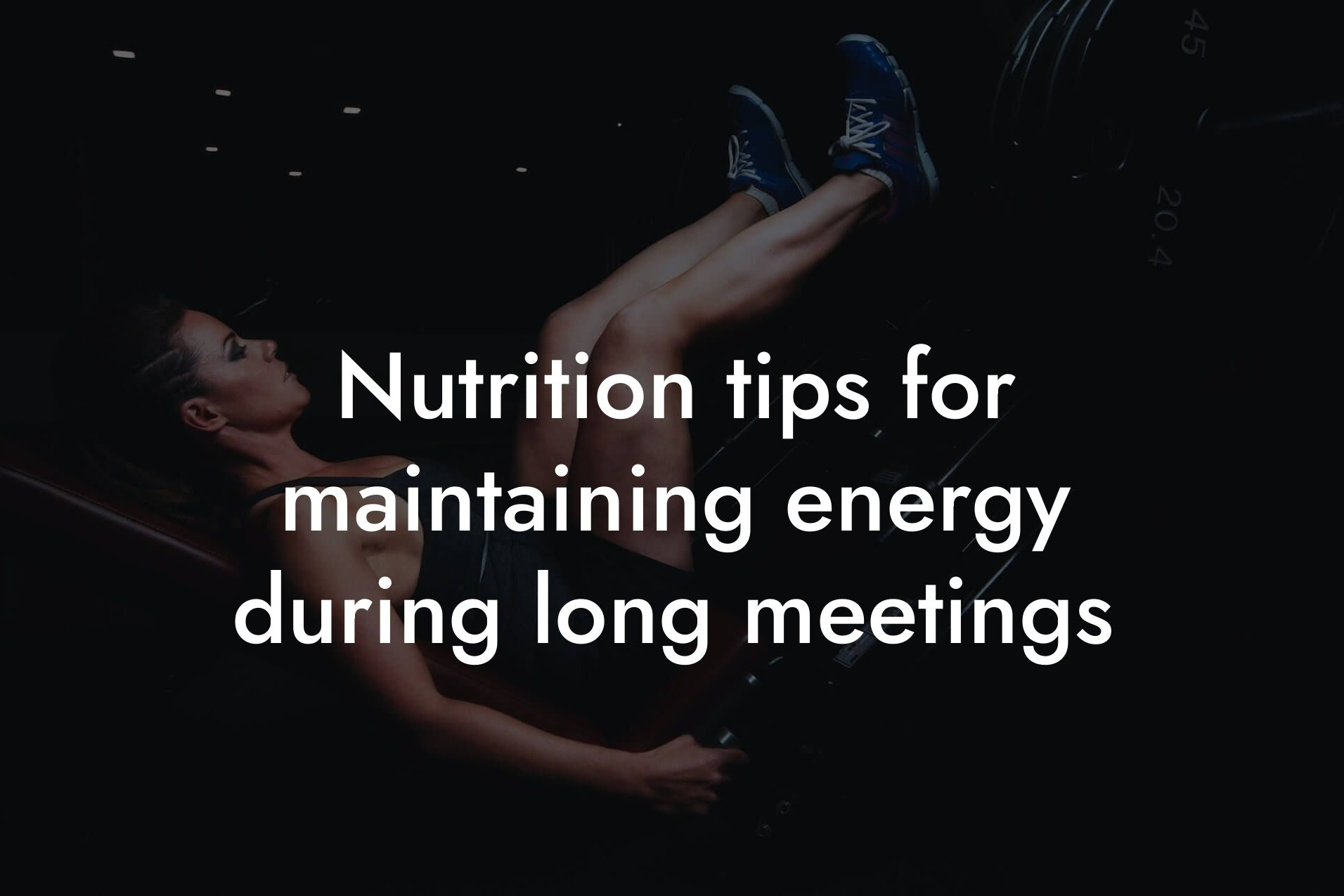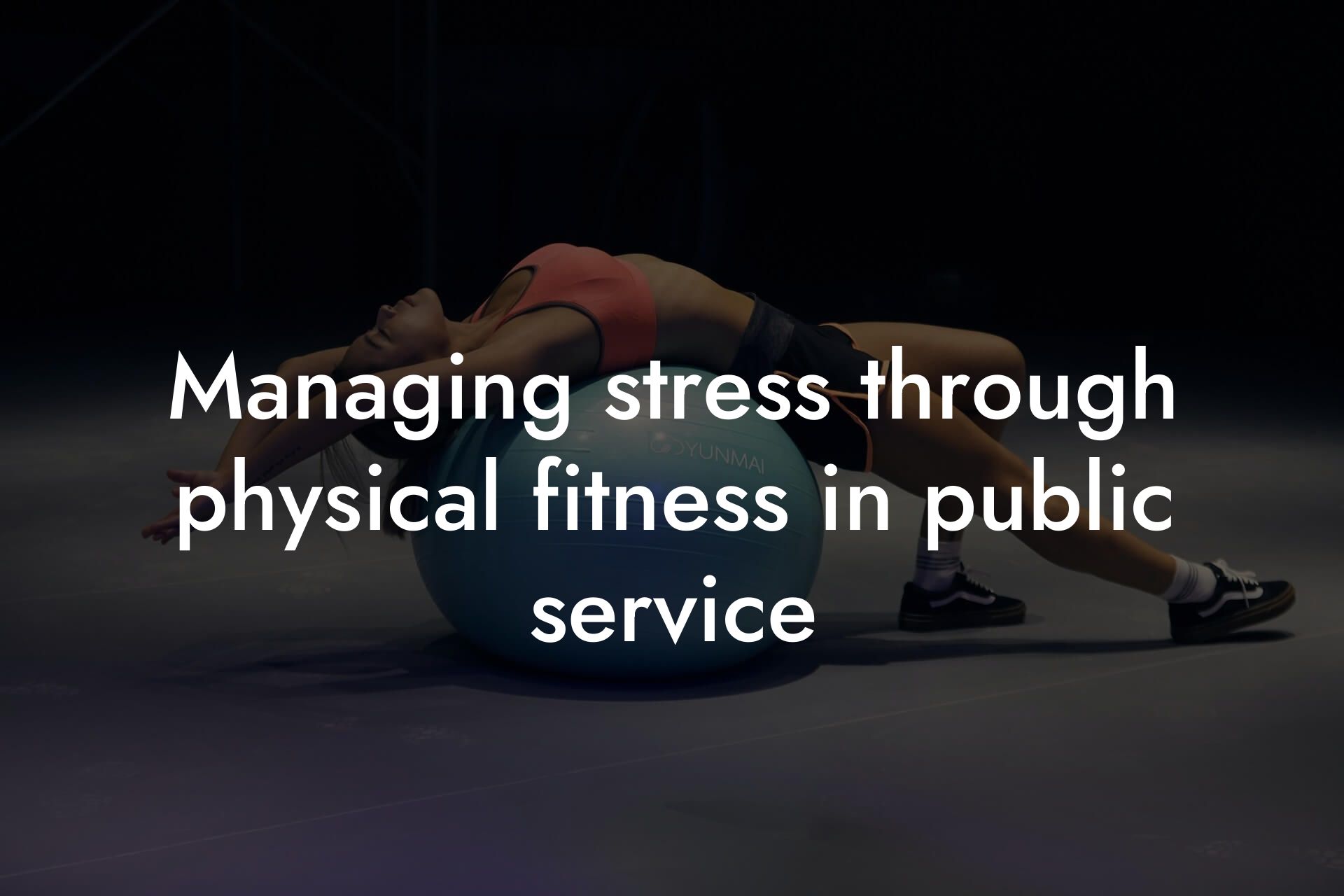As a high-earning professional, you understand the importance of maintaining a healthy work-life balance. However, when you're dedicated to serving the public, it can be challenging to prioritize your personal fitness goals. Between long hours, demanding responsibilities, and the pressure to perform, it's easy to let your physical health take a backseat. But neglecting your fitness can have serious consequences on your overall well-being, productivity, and job performance. In this article, we'll explore the importance of balancing public service duties with personal fitness and provide practical tips to help you achieve a healthier, more balanced lifestyle.
Table of Contents
- The Consequences of Neglecting Personal Fitness
- The Benefits of Prioritizing Personal Fitness
- Challenges of Balancing Public Service Duties with Personal Fitness
- Practical Tips for Balancing Public Service Duties with Personal Fitness
- The Importance of Body Composition Analysis
- Final Thoughts
- Frequently Asked Questions
The Consequences of Neglecting Personal Fitness
When you're consumed by your public service duties, it's easy to overlook the importance of personal fitness. However, neglecting your physical health can have serious consequences on your overall well-being. Some of the common consequences of neglecting personal fitness include:
Weight gain and obesity, which can increase the risk of chronic diseases like diabetes, heart disease, and certain types of cancer
Decreased energy levels, which can affect your productivity and job performance
Impaired mental health, including anxiety, depression, and mood disorders
Poor sleep quality, which can further exacerbate physical and mental health problems
Decreased self-confidence and self-esteem, which can affect your personal and professional relationships
The Benefits of Prioritizing Personal Fitness
On the other hand, prioritizing personal fitness can have numerous benefits for high-earning professionals in public service. Some of the benefits include:
Improved physical health, including weight management, increased energy levels, and reduced risk of chronic diseases
Enhanced mental health, including reduced stress, anxiety, and depression
Improved sleep quality, which can boost energy levels and cognitive function
Increased self-confidence and self-esteem, which can translate to improved job performance and personal relationships
Enhanced cognitive function, including improved focus, concentration, and decision-making skills
Challenges of Balancing Public Service Duties with Personal Fitness
Balancing public service duties with personal fitness can be challenging, especially when you're working long hours or dealing with high-stress situations. Some of the common challenges include:
Time constraints, including long hours, irregular schedules, and limited free time
Physical demands of the job, including standing for long periods, lifting heavy objects, or working in high-stress environments
Emotional demands of the job, including dealing with traumatic situations, managing conflict, or providing emotional support to others
Lack of access to healthy food options or fitness facilities, especially when working in remote or rural areas
Pressure to prioritize work over personal fitness goals, especially when faced with tight deadlines or high-stakes projects
Practical Tips for Balancing Public Service Duties with Personal Fitness
Despite the challenges, there are several practical tips that can help high-earning professionals in public service balance their duties with personal fitness goals. Some of the tips include:
Scheduling fitness into your daily routine, even if it's just 30 minutes of exercise per day
Finding creative ways to stay active, such as taking the stairs instead of the elevator or doing desk exercises during breaks
Prioritizing sleep and aiming for 7-9 hours of sleep per night
Preparing healthy meals in advance, including packing snacks and lunches for work
Finding a workout buddy or accountability partner to provide motivation and support
Using technology, such as fitness apps or wearable devices, to track progress and stay motivated
The Importance of Body Composition Analysis
As a high-earning professional, you understand the importance of tracking progress and making data-driven decisions. When it comes to personal fitness, body composition analysis can provide valuable insights into your physical health. A DEXA machine, for example, can provide a comprehensive body assessment, including:
Body fat percentage, including visceral fat and lean mass
Bone density, including risk of osteoporosis or fractures
Lean mass distribution, including muscle mass and strength
Metabolic rate, including resting metabolic rate and caloric needs
By tracking these metrics, you can gain a better understanding of your physical health and make informed decisions about your fitness goals.
Balancing public service duties with personal fitness is essential for high-earning professionals who want to maintain a healthy work-life balance. By understanding the consequences of neglecting personal fitness, prioritizing fitness goals, and overcoming common challenges, you can achieve a healthier, more balanced lifestyle. Remember to schedule fitness into your daily routine, prioritize sleep, and track progress using body composition analysis. With the right mindset and tools, you can take your physical health to the next level and perform at your best in both your personal and professional life.
Final Thoughts
At Tano Performance Group, we understand the importance of balancing public service duties with personal fitness. Our DEXA machine provides a comprehensive body assessment, giving you the insights you need to take your physical health to the next level. Whether you're a high-earning professional in public service or simply looking to improve your overall well-being, we're here to help. Contact us today to learn more about our services and take the first step towards a healthier, more balanced lifestyle.
Frequently Asked Questions
How do I balance my public service duties with my personal fitness goals?
As a high-earning professional, it can be challenging to juggle your public service duties with your personal fitness goals. The key is to prioritize your time and make a schedule that works for you. Set specific times for your work, exercise, and personal activities, and stick to it. It's also essential to find exercises that can be done in a short amount of time, such as high-intensity interval training (HIIT) or bodyweight exercises, to fit into your busy schedule.
What are some exercises I can do during my lunch break?
There are many exercises you can do during your lunch break to stay active and fit. Some examples include taking a walk or jog outside, doing a quick HIIT workout in a nearby park, or even just doing some stretching exercises at your desk. You can also try bodyweight exercises like push-ups, squats, and lunges. Remember to keep it short and sweet, aiming for 20-30 minutes of exercise during your lunch break.
How can I stay motivated to exercise when I have a demanding job?
Staying motivated to exercise can be challenging, especially when you have a demanding job. One way to stay motivated is to set specific and achievable fitness goals for yourself. Break down your goals into smaller, manageable steps, and reward yourself when you reach them. You can also find a workout buddy or join a fitness group to provide accountability and support. Additionally, remind yourself why you started exercising in the first place, whether it's to improve your overall health or feel more confident in your appearance.
What are some healthy snack options I can take to work?
Eating healthy snacks throughout the day can help boost your energy and support your fitness goals. Some healthy snack options you can take to work include nuts and seeds, fruits and vegetables, protein bars, and trail mix. Avoid sugary or processed snacks that can hinder your progress. You can also prepare your own snacks at home, such as energy balls or protein smoothies, to take with you to work.
How can I prioritize self-care when I have a busy schedule?
Prioritizing self-care is essential for your overall well-being, including your physical and mental health. Make time for activities that bring you joy and relaxation, such as reading, taking a bath, or practicing yoga. Even small moments of self-care, such as taking a few deep breaths or stretching your arms and legs, can make a big difference. Remember, taking care of yourself is not selfish – it's necessary to perform at your best.
What are some tips for getting enough sleep when I have a demanding job?
Getting enough sleep is crucial for your physical and mental health, especially when you have a demanding job. Aim for 7-9 hours of sleep each night, and establish a consistent sleep schedule. Create a relaxing bedtime routine, such as reading a book or taking a warm bath, to signal to your body that it's time to sleep. Avoid screens and stimulating activities before bedtime, and create a dark, quiet sleep environment.
How can I stay hydrated throughout the day?
Staying hydrated is essential for your overall health and fitness. Aim to drink at least 8-10 glasses of water each day, and avoid sugary drinks that can dehydrate you. Bring a refillable water bottle with you to work, and take sips throughout the day. You can also infuse your water with fruits or herbs for added flavor and nutrition.
What are some ways I can reduce stress and anxiety?
Reducing stress and anxiety is essential for your overall well-being, including your physical and mental health. Some ways to reduce stress and anxiety include practicing mindfulness, meditation, or deep breathing exercises. You can also try yoga, tai chi, or other relaxation techniques to calm your mind and body. Additionally, prioritize self-care activities, such as taking a walk or reading a book, to help manage stress and anxiety.
How can I fit exercise into my busy schedule?
Fitting exercise into your busy schedule can be challenging, but it's not impossible. Start by scheduling your workouts into your calendar, just as you would any other appointment. Find exercises that can be done in short amounts of time, such as HIIT workouts or bodyweight exercises. You can also try breaking up your workouts into smaller sessions throughout the day, such as taking a short walk during your lunch break or doing a few jumping jacks during commercial breaks.
What are some benefits of prioritizing my physical fitness?
Prioritizing your physical fitness can have numerous benefits for your overall health and well-being. Some benefits include increased energy levels, improved mental clarity, and enhanced physical appearance. You may also experience improved sleep quality, reduced stress and anxiety, and increased confidence and self-esteem. Additionally, prioritizing your physical fitness can improve your overall health, reducing your risk of chronic diseases such as heart disease and diabetes.
How can I stay accountable to my fitness goals?
Staying accountable to your fitness goals is essential for achieving success. One way to stay accountable is to find a workout buddy or join a fitness group. You can also track your progress through a fitness app or journal, and share your goals with a friend or family member. Additionally, set specific and achievable goals for yourself, and reward yourself when you reach them.
What are some healthy meal options I can prepare at home?
Preparing healthy meals at home can be quick and easy, even with a busy schedule. Some healthy meal options include grilled chicken or fish with roasted vegetables, quinoa or brown rice bowls with lean protein and steamed vegetables, and hearty salads with lean protein and whole grains. You can also prep meals in advance, such as cooking a large batch of rice or roasted vegetables, to save time during the week.
How can I prioritize my fitness goals when I have a lot of work commitments?
Prioritizing your fitness goals when you have a lot of work commitments can be challenging, but it's not impossible. Start by scheduling your workouts into your calendar, just as you would any other appointment. Make your fitness goals a non-negotiable part of your daily routine, just like brushing your teeth or taking a shower. Additionally, find exercises that can be done in short amounts of time, such as HIIT workouts or bodyweight exercises, to fit into your busy schedule.
What are some ways I can track my progress and stay motivated?
Tracking your progress and staying motivated is essential for achieving your fitness goals. Some ways to track your progress include taking progress photos, tracking your measurements, or monitoring your weight loss. You can also track your workouts, including the exercises you do and the weight you lift, to see how you're improving over time. Additionally, celebrate your small victories along the way, such as increasing your water intake or completing a challenging workout.
How can I make time for exercise when I have a family?
Making time for exercise when you have a family can be challenging, but it's not impossible. Start by scheduling your workouts into your calendar, just as you would any other appointment. Find exercises that can be done at home, such as bodyweight exercises or yoga, to save time and eliminate the need for childcare. You can also involve your family in your workouts, such as going for a bike ride or playing a game of soccer together.
What are some benefits of having a workout buddy?
Having a workout buddy can have numerous benefits for your fitness journey. Some benefits include increased accountability, motivation, and support. You can also learn new exercises and techniques from your workout buddy, and provide encouragement and support to each other. Additionally, having a workout buddy can make exercise more enjoyable and social, helping to reduce boredom and increase adherence.
How can I stay motivated to exercise during the winter months?
Staying motivated to exercise during the winter months can be challenging, especially when it's cold and dark outside. One way to stay motivated is to find indoor exercises that you enjoy, such as yoga or weightlifting. You can also try finding a workout buddy or joining a fitness group to provide accountability and support. Additionally, remind yourself of your fitness goals and why you started exercising in the first place, and celebrate your small victories along the way.
What are some tips for getting started with a new exercise routine?
Getting started with a new exercise routine can be intimidating, but it doesn't have to be. Start by setting specific and achievable goals for yourself, and find exercises that you enjoy. Begin with short, manageable workouts and gradually increase the intensity and duration as you become more comfortable. Additionally, find a workout buddy or join a fitness group to provide accountability and support, and celebrate your small victories along the way.
How can I prioritize my fitness goals when I have a lot of social commitments?
Prioritizing your fitness goals when you have a lot of social commitments can be challenging, but it's not impossible. Start by scheduling your workouts into your calendar, just as you would any other appointment. Make your fitness goals a non-negotiable part of your daily routine, just like brushing your teeth or taking a shower. Additionally, find exercises that can be done in short amounts of time, such as HIIT workouts or bodyweight exercises, to fit into your busy schedule.
What are some benefits of incorporating strength training into my workout routine?
Incorporating strength training into your workout routine can have numerous benefits for your overall health and fitness. Some benefits include increased muscle mass, bone density, and metabolism, as well as improved joint health and reduced risk of injury. You may also experience increased confidence and self-esteem, as well as improved overall physical appearance.
How can I make healthy choices when eating out?
Making healthy choices when eating out can be challenging, but it's not impossible. Start by doing your research, looking up the menu and nutrition information online before you go. Choose restaurants that offer healthy options, such as grilled chicken or fish with roasted vegetables. Avoid fried and processed foods, and opt for whole grains and lean protein sources instead. Additionally, don't be afraid to ask for modifications, such as holding the cheese or sauces.
What are some tips for staying hydrated during exercise?
Staying hydrated during exercise is essential for your overall health and performance. Some tips for staying hydrated include drinking water before, during, and after exercise, as well as avoiding sugary drinks that can dehydrate you. Bring a refillable water bottle with you to the gym, and take sips throughout your workout. You can also infuse your water with electrolytes, such as coconut water or sports drinks, to replenish lost nutrients.
Here are some related articles you might love...
- How government workers can stay fit during office hours
- Nutrition tips for maintaining energy during long meetings
- Managing stress through physical fitness in public service
- How to stay active during legislative sessions
- How DEXA scans can benefit government professionals
- The connection between fitness and public trust
- The role of physical health in community leadership
- The impact of body composition on public service effectiveness
- Quick workouts for government workers on tight schedules
Zak Faulkner
Zak Faulkner is a leading authority in the realm of physical health and body composition analysis, with over 15 years of experience helping professionals optimise their fitness and well-being. As one the experts behind Tano Performance Group, Zak has dedicated his career to providing in-depth, science-backed insights that empower clients to elevate their physical performance and overall health.
With extensive knowledge of DEXA technology, Zak specializes in delivering comprehensive body assessments that offer precise data on body fat, muscle mass, bone density, and overall physique. His expertise enables individuals to make informed decisions and achieve their fitness goals with accuracy and confidence. Zak’s approach is rooted in a deep understanding of human physiology, combined with a passion for helping clients unlock their full potential through personalised strategies.
Over the years, Zak has earned a reputation for his commitment to excellence, precision, and client-focused service. His guidance is trusted by top professionals who demand the best when it comes to their health. Whether advising on fitness programs, nutritional strategies, or long-term wellness plans, Zak Faulkner’s insights are a valuable resource for anyone serious about taking their health and fitness to the next level.
At Tano Performance Group, Zak continues to lead our Content Team revolutionising how professionals approach their physical health, offering unparalleled expertise that drives real results.




